Last week BBC updated its backgrounder on China and Taiwan, entitled “What’s behind the China-Taiwan Divide?” BBC’s backgrounders on Taiwan have been (cough, cough) very creative, and this latest iteration, while an improvement over the earlier versions, is a proud torch-bearer for that tradition.
The BBC begins by observing that “Austronesian tribal people” were the first people in Taiwan. What does the use of the word “tribal” suggest about those people, compared to the Chinese?
After that, the Aborigines disappear from the story. Because they have the earliest and strongest claim to Taiwan? To keep them in view would of course expose the deep racism of China’s claims to Taiwan.
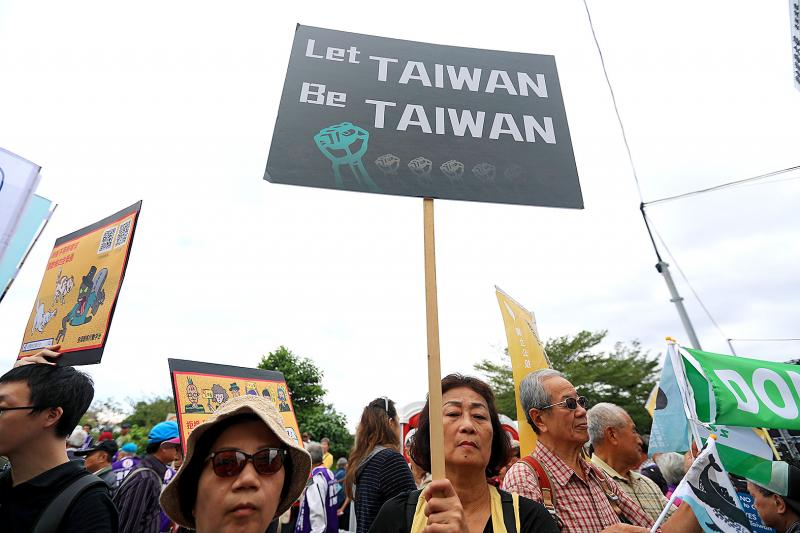
Photo: EPA-EFE
TELLING OMISSIONS
BBC’s creative interpretations of Taiwan history then commence. It avers that the island first appears in Chinese records in 239 CE, and says “China” sent an expedition to explore the area, which BBC asserts is a “fact”. There was no “China” then — the men were sent out by the Kingdom of Wu.
It is quite true that a third century text, the “Book of Wu” (吳書) in the Records of the Three Kingdoms (三國志) says that Emperor Sun Quan (孫權) of Wu commanded two generals to find Yizhou (夷洲) around 230 CE. The text contains a few lines lacking any details to identify where or what Yizhou is.
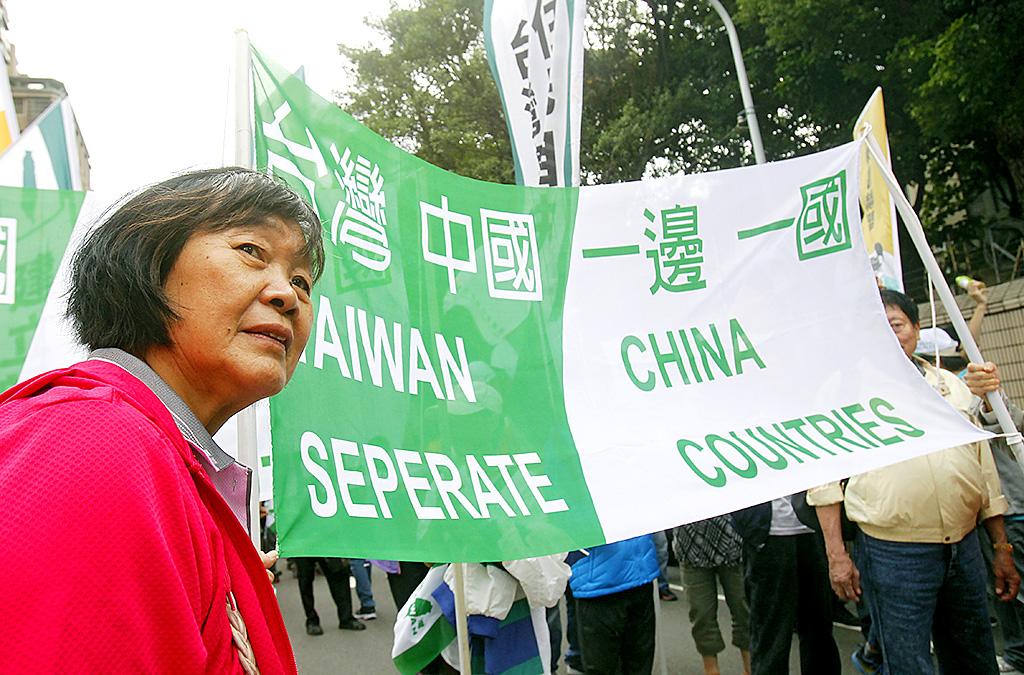
Photo: AP
In a Song Dynasty text, centuries later, there is a lengthy description of the habits of the Yizhou people, but again, there is nothing that specifically relates to Taiwan. It could well be discussing any number of peoples of the coastal islands off what is now China. Since the ancient Chinese were not deep-water sailors but coast huggers, it is highly unlikely that Sun’s subordinates ever made it to Taiwan (consider also that crossing the Taiwan Strait was dangerous and required good working knowledge of the currents and winds). The text locates Yizhou to the southeast of Wu, but Taiwan lies nearly due south of the kingdom. Okinawa, however, is in the right location.
BBC says this nugget of CCP expansionist propaganda is a “fact.”
When I teach or write on the media, I often say that the hardest thing to see in any text is what is not there. BBC’s omissions are telling.
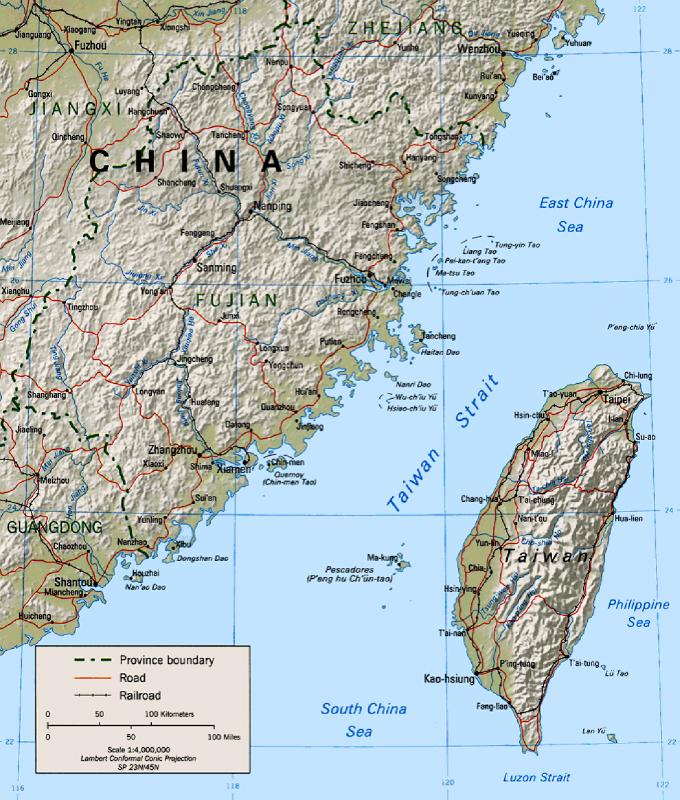
Photo courtesy of Wikimedia Commons
Despite their formative, profound effects on China-Taiwan relations, the 228 Incident, Martial Law and White Terror are gone. BBC still uses the softening phrase “dominated Taiwan’s politics” to refer to Chinese Nationalist Party (KMT) rule at gunpoint. The backgrounder now mentions authoritarian rule and resistance to it, but it fails to discuss the impact of colonial Chinese rule on Taiwan’s relations with China and the attitude of the Taiwanese toward China.
Also gone is mention of Taiwan’s legal status. Note that BBC uses the phraseology “Japan … relinquished control of territory it had taken from China” implying that the writer knows very well that sovereignty over Taiwan was not awarded to China, but BBC omits that. It thus omits any mention that Taiwan’s status under international law remains undecided, a position which happens to be UK government policy.
Another telling omission: the BBC discusses some of the developments of the 1990s but there is no mention of President Lee Teng-hui (李登輝), whose ushering in of Taiwan’s democracy also disappears. Instead, it attributes democratization to Chiang Ching-kuo (蔣經國) after pressure from the resistance to KMT rule. Lee, of course, is detested in pro-China, pro-KMT circles.
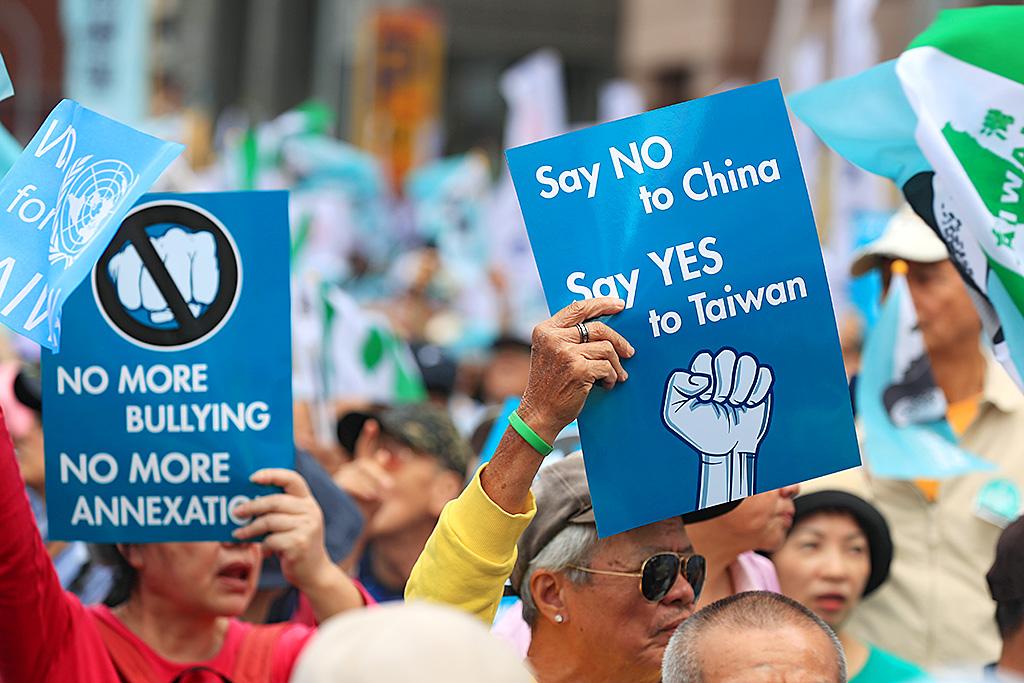
Photo: EPA-EFE
At least BBC mentions President Chen Shui-bian (陳水扁), who “alarmed” Beijing. What was his effect on people in Taiwan and their attitudes toward Taiwan’s status and toward China? Apparently BBC doesn’t know.
Moreover, out of the thousands of possible images of Chen, the BBC has chosen one in which Chen sports a giant zit on his nose, right in the center of the image.
In the best blame-the-victim style, BBC then says Chen’s reelection triggered the passage of Beijing’s “Anti-Secession” Law, which it describes as “stating China’s right to use ‘non-peaceful means’ against Taiwan.” China has no “right” to maim and murder Taiwanese and annex their island, nor could any law ever give it that right. The “Anti-Secession” Law is a declaration of intent only.
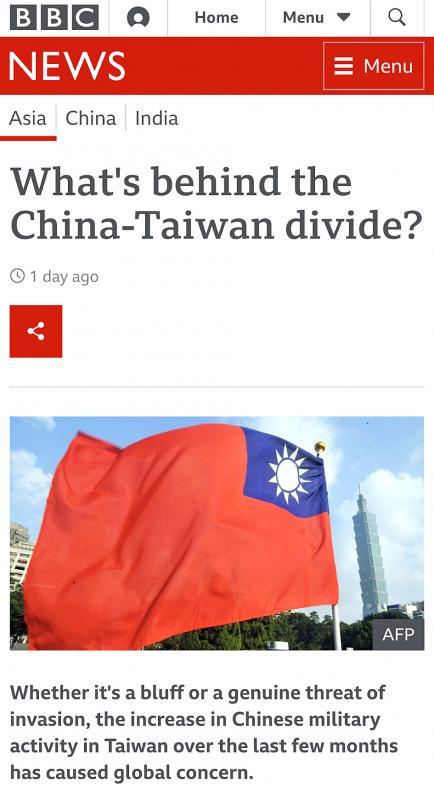
Screenshot
BBC would never scribe: “Nazi Germany’s security laws gave it the right to execute Jews” or “Russia’s laws give it the right to invade Estonia and Latvia.”
It would be instantly obvious how vile that thought is. Sadly, because major media organs continue to avoid forthright presentation of Taiwan’s international status and often frame the discussion as one of “rights,” they help legitimate China’s threats of violence against the people of Taiwan.
OUTRIGHT ERRORS
Along with the omissions, there are a couple of outright errors. BBC asserts “the US has an agreement to supply Taiwan with defensive weapons,” though no such agreement exists. BBC appears to be referring to the Taiwan Relations Act, an internal law of the US (not an agreement with Taiwan, which has no formal role in the act) which strongly encourages, though does not compel, the US to supply Taiwan with weapons.
One of the fascinating things about this backgrounder is that the reader is left without any clear knowledge of Taiwan’s status. Whenever BBC appears about to offer that information, it shies away, and ends its discussion by saying that Taiwan’s legal status is unclear. It is actually quite clear under international law, but BBC somehow fails to tell the reader. Why? Instead, it uses false equivalence to present China as having one view and Taiwan as having another.
It goes without saying that the BBC does not situate the “China-Taiwan divide” against the background of China’s other expansionist claims. This approach, an important perspective for understanding Chinese aggression and Taiwanese resistance, is all too common in the media.
At the end, BBC also omits any mention of polls in Taiwan showing that when respondents are given the two choices of being annexed to China or becoming an independent state, they overwhelmingly choose independence.
Even the National Chengchi University (國立政治大學) poll that is widely cited to pretend that Taiwanese prefer the “middle ground” as BBC calls it, shows that as of last year, annexation to China has little support, and most of the public prefers a political state which keeps Taiwan from far from Chinese rule. Even in that poll over 30 percent of the public prefers independence at some point.
The BBC’s attitude appears to be signaled by the title chosen for the piece, with its mention of the China-Taiwan “divide” as if the two belonged together, an assumptive framing. Instead of “divide” the BBC could have used the more neutral “issue.” This assumptive posture colors the framing of the entire piece, in which BBC refers to independence “from” China, though Taiwan is not currently part of China (despite two Chinese governments claiming it is).
BBC heads its explanation of recognition of Taiwan by noting “There is disagreement and confusion about what Taiwan is.” That’s entirely correct, and sadly, a good chunk of the confusion and disagreement appears to reside within BBC’s editorial offices.
Notes from Central Taiwan is a column written by long-term resident Michael Turton, who provides incisive commentary informed by three decades of living in and writing about his adoptive country.

April 14 to April 20 In March 1947, Sising Katadrepan urged the government to drop the “high mountain people” (高山族) designation for Indigenous Taiwanese and refer to them as “Taiwan people” (台灣族). He considered the term derogatory, arguing that it made them sound like animals. The Taiwan Provincial Government agreed to stop using the term, stating that Indigenous Taiwanese suffered all sorts of discrimination and oppression under the Japanese and were forced to live in the mountains as outsiders to society. Now, under the new regime, they would be seen as equals, thus they should be henceforth

Last week, the the National Immigration Agency (NIA) told the legislature that more than 10,000 naturalized Taiwanese citizens from the People’s Republic of China (PRC) risked having their citizenship revoked if they failed to provide proof that they had renounced their Chinese household registration within the next three months. Renunciation is required under the Act Governing Relations Between the People of the Taiwan Area and the Mainland Area (臺灣地區與大陸地區人民關係條例), as amended in 2004, though it was only a legal requirement after 2000. Prior to that, it had been only an administrative requirement since the Nationality Act (國籍法) was established in

Three big changes have transformed the landscape of Taiwan’s local patronage factions: Increasing Democratic Progressive Party (DPP) involvement, rising new factions and the Chinese Nationalist Party’s (KMT) significantly weakened control. GREEN FACTIONS It is said that “south of the Zhuoshui River (濁水溪), there is no blue-green divide,” meaning that from Yunlin County south there is no difference between KMT and DPP politicians. This is not always true, but there is more than a grain of truth to it. Traditionally, DPP factions are viewed as national entities, with their primary function to secure plum positions in the party and government. This is not unusual

The other day, a friend decided to playfully name our individual roles within the group: planner, emotional support, and so on. I was the fault-finder — or, as she put it, “the grumpy teenager” — who points out problems, but doesn’t suggest alternatives. She was only kidding around, but she struck at an insecurity I have: that I’m unacceptably, intolerably negative. My first instinct is to stress-test ideas for potential flaws. This critical tendency serves me well professionally, and feels true to who I am. If I don’t enjoy a film, for example, I don’t swallow my opinion. But I sometimes worry